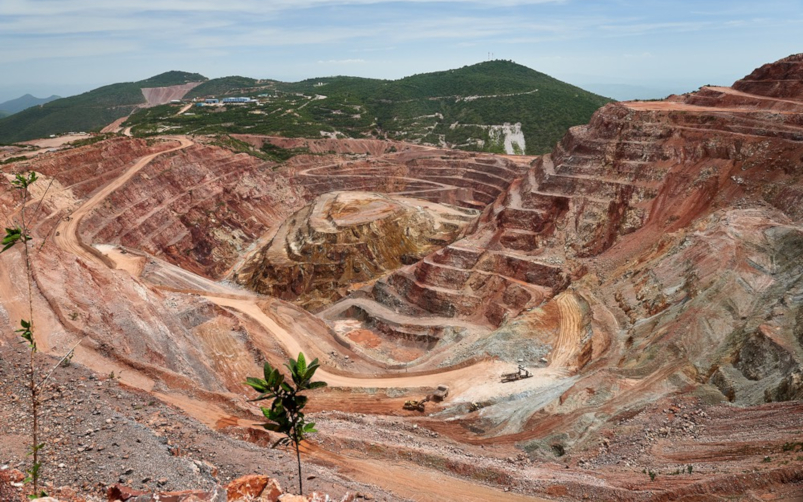Test mining at Fortune Minerals' NICO project in the Northwest Territories. Courtesy of Fortune Minerals
Mining companies in the Northwest Territories will be required to make benefits agreements (BAs) with individual Indigenous governments, if changes to the territory’s Mineral Resources Act are passed.
“The territorial government will not be negotiating these benefit agreements on behalf of Indigenous governments — Indigenous governments will have the freedom to do so based on their wants and needs, and proponents can make offers based on their project’s characteristics,” said Mike Westwick, a spokesperson for the industry, tourism and investment department. However, the act, tabled this month, will provide a mechanism for the territorial government to intervene in BA processes if the parties cannot agree on the terms of the agreement.
Westwick said the updated act would require mining companies to provide proof an agreement has been signed to the minster.
Fortune Minerals COO Glen Koropchuk said he wonders if the mandate is necessary. “Participation agreements with Indigenous communities are already widely accepted by industry today. However, this has been industry directly engaging with Indigenous communities without public government involvement,” he said. “At this point it is likely that both industry and Indigenous governments have the same question — will the proposed law help or hinder the process?”
Fortune Minerals and the N.W.T. government recently signed a socio-economic agreement, which sets out certain local hiring and procurement rates, including promises for Indigenous employment for Fortune’s NICO project, located some 160 kilometres northwest of Yellowknife. The agreement, different from a BA, was not negotiated with the Tłı̨chǫ government, on whose territory the proposed mine sits. The Tłı̨chǫ skipped the document’s signing in protest, and said in a statement they had not been given a copy of the agreement until just before its signing.
“The Tłı̨chǫ should be primary,” Grand Chief George Mackenzie said in a statement posted to the Tłı̨chǫ government’s website. “We hear this information at the last hour, we are very disappointed with the GNWT and Fortune Minerals and how they conducted their business on this particular issue.”
For the Tłı̨chǫ, the proposed requirement for BAs offers a level of stability they think is important.
“We especially welcome the requirement for benefit agreements and engagement with our governments on new claims. These clauses will help Tłı̨chǫ people and northerners really benefit from mineral development,” Mackenzie said in a statement.
Related: Ontario does away with traditional staking process in mining act modernization
The Tłı̨chǫ also said they are committed to negotiating an access agreement with Fortune for the construction of an access road to the project.
“Fortune made a commitment during the environmental assessment process to negotiate and sign a participation agreement with the Tłı̨chǫ government, so with or without the proposed law there will be a Participation Agreement for NICO,” Koropchuk said.
Also in the proposed changes is the addition of online staking, which would allow prospectors to mark off exploration claims without the burden of physically staking the ground.
Westwick said there are different factors to be weighed with the introduction of online staking, but it is the direction the industry is heading.
“As far as drawbacks, it’s definitely something we considered. Prospecting has a long history here and it has spurred a lot of business opportunity over the years,” he said. “However, we don’t foresee that online map staking would mean no one gets out on the land to evaluate where they want to stake claims.”
He said even if the area is staked online, there is plenty of important on-the-ground work to be done.
Koropchuk said online staking was a good addition to the prospecting regime in the territory, with benefits beyond not having to physically stake out the area.
“It also reduces the potential for disputes among parties during staking rushes or, in the event of overlapping claims that sometimes occur during the periods between physical claim staking and the recording of that claim,” he said.
Online map staking would still require prospectors to know what areas they should select as their claim areas on the map. This will be particularly important in the Northwest Territories, where many lands have not yet been explored. Physical sampling would likely still be desirable.
One of the things not addressed in the new bill is royalties, but a comprehensive review is underway. Westwick said the current royalty regime will remain while the review takes place.
“As far as royalties, we’ve sent a strong message that the conversation should be about revenues, not just a royalty rate. It should be about taxes, royalties, fees, benefit agreements — anything that affects the overall fiscal picture. We’ve indicated that we’re going to give that review the time it deserves in the next government,” he said.
For industry, the worry is an increase in rates that could kill competitiveness without taking into account the financial risk miners take on during the exploration and development phase.
“The amount that is to be paid should be standardized and identified by governments prior to a proponent investing significant funds toward exploration and development,” Koropchuk said. “It would not be fair to the proponent if the public or Indigenous government were to simply extract the maximum amount possible from a successful mineral discovery after the risk money has already been spent.
“We operate in a global economy and Canada’s North is already disadvantaged from much higher costs to identify and develop mines because of physical remoteness, cold climates, a significant infrastructure deficit, long supply lines, and the need to construct facilities that already exist in more developed southern locations,” he said.
CORRECTION, MARCH 1: The Northwest Territories is making benefits agreements mandatory, not impact and benefits agreements as we originally reported. Project impacts are addressed by territorial land and water boards, and benefits will be addressed by the updated legislation. CIM Magazine regrets the error.



